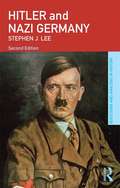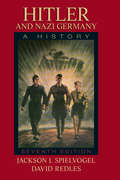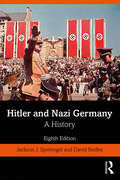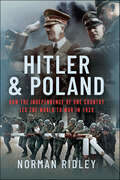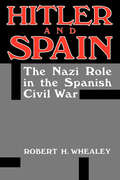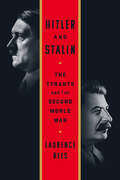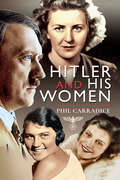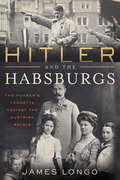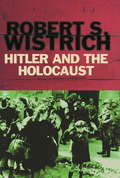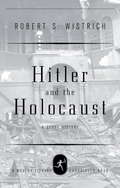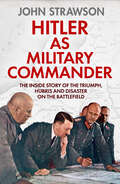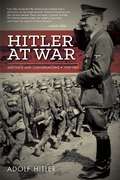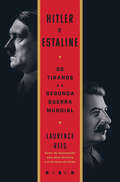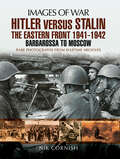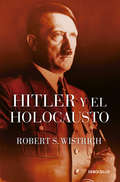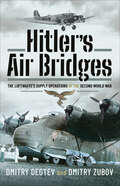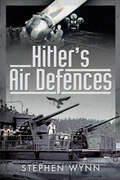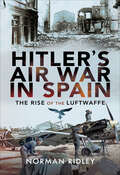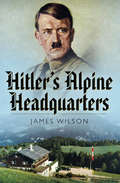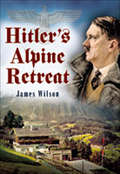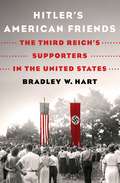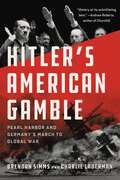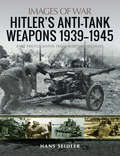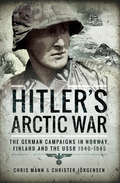- Table View
- List View
Hitler and Nazi Germany (Questions and Analysis in History)
by Stephen J. LeeHitler and Nazi Germany provides a concise introduction to Hitler’s rise to power and Nazi domestic and foreign policies through to the end of the Second World War. Combining narrative, the views of different historians, interpretation and a selection of sources, this book provides a concise introduction and study aid for students. This second edition has been extensively revised and expanded and includes new chapters on the Nazi regime, the SS and Gestapo, and the Second World War. Expanded background narratives provide a solid understanding of the period and the analyses and sources have been updated throughout to help students engage with recent historiography and form their own interpretation of events.
Hitler and Nazi Germany, Instructor's Manual with Test Item File (Download Only): A History
by Jackson J. SpielvogelThis text is based on current research findings and is written for students and general readers who want a deeper understanding of this period in German history. It provides a balanced approach in examining Hitler's role in the history of the Third Reich and includes coverage of the economic, social, and political forces that made the rise and growth of Nazism possible; the institutional, cultural, and social life of the Third Reich; the Second World War; and the Holocaust.
Hitler and Nazi Germany: A History
by Jackson J. Spielvogel David RedlesHitler and Nazi Germany: A History is a brief but comprehensive survey of the Third Reich based on current research findings that provides a balanced approach to the study of Hitler’s role in the history of the Third Reich. The book considers the economic, social, and political forces that made possible the rise and development of Nazism; the institutional, cultural, and social life of the Third Reich; World War II; and the Holocaust. World War II and the Holocaust are presented as logical outcomes of the ideology of Hitler and the Nazi movement. This new edition contains more information on the Kaiserreich (Imperial Germany), as well as Nazi complicity in the Reichstag Fire and increased discussion of consent and dissent during the Nazi attempt to create the ideal Volksgemeinschaft (people’s community). It takes a greater focus on the experiences of ordinary bystanders, perpetrators, and victims throughout the text, includes more discussion of race and space, and the final chapter has been completely revised. Fully updated, the book ensures that students gain a complete and thorough picture of the period and issues. Supported by maps, images, and thoroughly updated bibliographies that offer further reading suggestions for students to take their study further, the book offers the perfect overview of Hitler and the Third Reich.
Hitler and Poland: How the Independence of one Country led the World to War in 1939
by Norman RidleyThis book explores the tumultuous period following the First World War, where Poland, caught between the competing ambitions of Germany and the Soviet Union, navigates political upheaval, territorial disputes, and the emerging threat of Hitler. Following the end of the First World War, the newly reformed state of Poland was wedged uncomfortably between the two dominant nations of Germany and the Soviet Union. With their diametrically opposed political philosophies, both of Poland’s neighbours plotted continuously to reclaim its lands that had up until recently been part of the once great but now defunct German and Russian empires. In order to protect itself, Poland was obliged to plot and negotiate with both of its neighbours to try and prevent them from realising their ambitions to eviscerate the country. The United States had been instrumental in the creation of the Polish state after the First World War, Wilson in particular stoking the Poles’ growing powerful nationalistic fervour. As Norman Ridley reveals, this was the beginning of a turbulent period for Poland. There was, for example, the dramatic and improbable ‘Miracle on the Vistula’ when Polish forces defeated the communist Red Army in 1920 – and in so doing halted the spread of communism across eastern Europe. As well as bitter ethnic battles between Germany and Poland for the political control of Upper Silesia, there were also the burning ambitions of Weimar Germany, and later Nazi Germany, to reclaim lands stripped from them and incorporated into the new state of Poland at Versailles. Despite America’s initial support after the war, the US thereafter showed little interest in Poland’s predicament. While France was a traditional friend to the Polish peoples, and a significant supplier of military aid, its political influence over eastern European affairs weakened as its own political institutions fell prey to extremes of both left and right and its immediate post-war dominance waned. Britain was interested only in commerce and that made Germany and Russia significantly more important as trading partners than the predominantly agricultural and technically backward state of Poland. Despite the dominance of right-wing politics in Poland, the emergence of Hitler and the Nazis in Germany did little to bring the countries together. This even drove them further apart as the Führer ramped up his rhetorical assault on the perceived injustices of Versailles, which were soon to translate into territorial expansion over Austria and Czechoslovakia. Poland was to be the next in line. Britain and France belatedly roused themselves to challenge the threat posed by Hitler and the Nazis. After the capitulation of the Anschluss and the humiliation of Munich, London and Paris found themselves in the disagreeable position of seeing no option but to throw their whole weight behind the integrity of the Polish state if they were ever going to make any sort of stand against Nazi aggression.
Hitler and Spain: The Nazi Role in the Spanish Civil War
by Robert H. Whealey“An imperative starting point of any future inquiry concerning Nazi Germany’s incursion into and manipulation of Spain’s civil strife.” —International History ReviewThe Spanish Civil War, begun in July 1936, was a preliminary round of World War II. Hitler’s and Mussolini’s cooperation with General Franco resulted in the Axis agreement of October 1936 and the subsequent Pact of Steel of May 1939, immediately following the end of the Civil War.This study presents comprehensive documentation of Hitler’s use of the upheaval in Spain to strengthen the Third Reich diplomatically, ideologically, economically, and militarily. While the last great cause drew all eyes to Western Europe and divided the British and especially the French internally, Hitler could pursue territorial gains in Eastern Europe.This book, based on little-known German records and recently opened Spanish archives, fills a major gap in our understanding of one of the twentieth century’s most significant conflicts. Its comprehensive treatment of German-Spanish relations from 1936 through 1939, bringing together diplomatic, economic, military, and naval aspects, will be of great value to specialists in European diplomacy and the political economy of Nazi imperialism, as well as to all students of the Spanish Civil War.“A major contribution to understanding not only the Spanish conflict, but also the history of the thirties and, in particular, the failure of Britain, France and the Soviet Union to make common cause against fascist powers.” —History Workshop Journal
Hitler and Stalin: The Tyrants and the Second World War
by Laurence ReesAn award-winning historian plumbs the depths of Hitler and Stalin's vicious regimes, and shows the extent to which they brutalized the world around them.Two 20th century tyrants stand apart from all the rest in terms of their ruthlessness and the degree to which they changed the world around them. Briefly allies during World War II, Adolph Hitler and Josef Stalin then tried to exterminate each other in sweeping campaigns unlike anything the modern world had ever seen, affecting soldiers and civilians alike. Millions of miles of Eastern Europe were ruined in their fight to the death, millions of lives sacrificed. Laurence Rees has met more people who had direct experience of working for Hitler and Stalin than any other historian. Using their evidence he has pieced together a compelling comparative portrait of evil, in which idealism is polluted by bloody pragmatism, and human suffering is used casually as a political tool. It's a jaw-dropping description of two regimes stripped of moral anchors and doomed to destroy each other, and those caught up in the vicious magnetism of their leadership.
Hitler and his Women
by Phil CarradiceThis unique biography examines Hitler&’s many female relationships, from his mother and sisters to his girlfriends, secretaries, and adoring public. To most of the world, Adolf Hitler was a ranting, evil demagogue whose insane ambitions caused incalculable harm to humanity. But to the women in his life, he was kind, compassionate, and loving—a man to be admired and adored. In Hitler and His Women, historian Phil Carradice explores the Fuhrer&’s many relationships with women, from his romantic involvements to his interactions with female staff and the thousands of women who flocked to hear him speak. While many are familiar with Eva Braun, she was not alone in her role as the Fuhrer&’s lover. Dozens of women preceded her, including Mitzi Reiter, Henny Hoffmann, and his own niece Geli Raubal. To them and many others, Hitler was the ultimate romantic. From deep familial bonds to a teenage infatuation with a girl he never met, from actresses like Zara Leander to English aristocrat Unity Mitford, Carradice examines how Hitlers relationships with women affected the course of history.
Hitler and the Habsburgs: The Führer's Vendetta Against the Austrian Royals
by James Longo&“A detailed and moving picture of how the Habsburgs suffered under the Nazi regime…scrupulously sourced, well-written, and accessible.&”—Publishers Weekly (starred review) It was during five youthful years in Vienna that Adolf Hitler's obsession with the Habsburg Imperial family became the catalyst for his vendetta against a vanished empire, a dead archduke, and his royal orphans. That hatred drove Hitler's rise to power and led directly to the tragedy of the Second World War and the Holocaust. The royal orphans of Archduke Franz Ferdinand—offspring of an upstairs-downstairs marriage that scandalized the tradition-bound Habsburg Empire—came to personify to Adolf Hitler, and others, all that was wrong about modernity, the twentieth century, and the Habsburgs&’ multi-ethnic, multi-cultural Austro-Hungarian Empire. They were outsiders in the greatest family of royal insiders in Europe, which put them on a collision course with Adolf Hitler. As he rose to power Hitler's hatred toward the Habsburgs and their diverse empire fixated on Franz Ferdinand's sons, who became outspoken critics and opponents of the Nazi party and its racist ideology. When Germany seized Austria in 1938, they were the first two Austrians arrested by the Gestapo, deported to Germany, and sent to Dachau. Within hours they went from palace to prison. The women in the family, including the Archduke's only daughter, Princess Sophie Hohenberg, declared their own war on Hitler. Their tenacity and personal courage in the face of betrayal, treachery, torture, and starvation sustained the family during the war and in the traumatic years that followed. Through a decade of research and interviews with the descendants of the Habsburgs, scholar James Longo explores the roots of Hitler's determination to destroy the family of the dead Archduke—and uncovers the family members' courageous fight against the Führer.
Hitler and the Holocaust
by Prof Robert S. WistrichA superb short historical analysis of the Holocaust, by one of the world's leading authorities on the subjectRobert Wistrich begins by exploring the origins of anti-Semitism in Europe, and especially in Germany, to try to explain how millions of Jews came to be killed systematically by the Third Reich. In the process of relating these events, he provides new and incisive answers to a number of central questions concerning the Shoah that have emerged over recent years: who, inside and outside Nazi Germany, knew that Jews were being murdered; how responsibility for the genocide should be divided between Hitler himself and ordinary Germans; and how historians have tried to make sense of the Holocaust.The book concludes by considering the legacy of Nazi crimes since 1945: the Nuremburg trials, the impact of the Holocaust on Diaspora Jewry (particularly in Israel and America), and the rise of neo-Nazism and Holocaust-denial.
Hitler and the Holocaust
by Robert S. WistrichHitler and the Holocaust is the product of a lifetime's work by one of the world's foremost authorities on the history of anti-Semitism and modern Jewry. Robert S. Wistrich examines Europe's long history of violence against its Jewish populations, looks at the forces that shaped Hitler's belief in a "satanic Jewish power" that must be eradicated, and discusses the process by which Hitler gained power and finalized his plans for mass genocide. He concludes by addressing the abiding legacy of the Holocaust and the lessons that can be drawn from it. Combining a comprehensive picture of one of the most cataclysmic periods in recent history with contemporary scholarly developments and fresh historical inquiry, Hitler and the Holocaust is an indelible contribution to the literature of history.
Hitler as Military Commander
by John StrawsonWas Hitler 'the greatest strategic genius of all time' as Nazi propaganda had it, or just an amateur? Why was the startling success of his campaigns in Poland and France followed by the blundering mistakes in Russia, North Africa and France? Might Germany even have won the war without Hitler's continual and disastrous interference? In this extraordinary history, John Strawson answers these and other questions by showing how Hitler's insatiable preoccupation with war and conquest was translated into reality. While the power of a revitalized German army came from Hitler, Strawson examines the Fuhrer's eccentric use of the most formidable war machine the world had ever seen. This lucid story of fire and incompetence is brought alive by the accounts of those who served Hitler both on his staff and as field commanders. Perfect for readers of Ian Kershaw and Anthony Beevor.
Hitler at War
by Robert L. MillerDuring World War II Adolf Hitler held innumerable meetings with diplomats, Nazi leaders, Axis allies, German generals, and others. This is a selection of significant conversations that are assembled for the first time in a single volume. They feature: Benito Mussolini, Sumner Welles, Heinrich Himmler, Hermann Göring, Philippe Pétain, Yosuke Matsuoka, Vyacheslav Molotov, Gustaf Mannerheim, Joseph Goebbels, Galeazzo Ciano, Francisco Franco, Pierre Laval, Vidkun Quisling, Miklós Horthy, the Grand Mufti, Subhas Chandra Bose, Wilhelm Keitel, Alfred Jodl, Erich von Manstein, Erwin Rommel, Walter Schellenberg, Karl Wolff, Albert Kesselring, Kurt Zeitzler, Albert Speer, and others.Robert L. Miller, editor, is the co-author of Encyclopedia of Cold War Espionage and Indochina and Vietnam: The Thirty-Five-Year War 1940-1975.
Hitler e Estaline: Os Tiranos e a Segunda Guerra Mundial
by Laurence ReesO conceituado historiador Laurence Rees mergulha nas profundezas dos regimes cruéis de Hitler e Estaline e mostra até que ponto os dois homens brutalizaram o mundo à sua volta. Dois ditadores do século XX distinguem-se pelo impacto e crueldade que tiveram no mundo. Aliados por um curto período de tempo durante a Segunda Guerra Mundial, Hitler e Estaline tentaram depois exterminar-se mutuamente em campanhas de guerra nunca vistas no mundo moderno, afetando soldados e civis de igual modo. Quilómetros sem fim da Europa de Leste foram arruinados neste combate mortal e milhões de vidas foram sacrificadas. Recorrendo a testemunhos inéditos de soldados do Exército Vermelho e da Wehrmacht, de civis que sofreram durante o conflito e daqueles que conheceram pessoalmente os dois homens, esta obra-prima — o culminar de 30 anos de trabalho — do autor bestseller Laurence Rees, um dos melhores historiadores contemporâneos, analisa o percurso dos dois tiranos durante a Segunda Guerra Mundial, quando a Alemanha e a União Soviética travaram a maior e mais sangrenta guerra da História, demonstrando que, apesar de ferozes adversários, Hitler e Estaline eram, em grande medida, os dois lados de uma mesma moeda. «Da autoria de um dos mais conceituados especialistas na Segunda Guerra Mundial, este é um relato importante, original — e devastador — de Hitler e Estaline como ditadores.» Robert Service, autor de Estaline — Uma Biografia «Neste estudo fascinante de dois monstros, Laurence Rees é extraordinariamente percetivo e original.» Sir Antony Beevor, autor de Estalinegrado «Laurence Rees combina de forma brilhante testemunhos poderosos, uma narrativa vívida e uma análise irrefutável neste soberbo relato de como dois terríveis ditadores lideraram os seus países na guerra mais destrutiva e desumana da História.» Sir Ian Kershaw, autor de Hitler «Um trabalho extraordinário e de grande coragem. Revelador, fascinante e extremamente relevante, mostra Hitler e Estaline como nunca foram mostrados. Uma verdadeira história do nosso tempo, com tantas lições a retirar para o mundo conturbado em que vivemos hoje que irá revolucionar o entendimento que temos destes dois tiranos.» Damien Lewis, autor de The Nazi Hunters
Hitler in the Crosshairs: A GI's Story of Courage and Faith
by John D. Woodbridge Maurice PossleyThis is the story of Ira “Teen” Palm, a soldier in World War II, from Mount Vernon, NY, through the European Theater of World War II, to his acquisition of a pistol engraved with Hitler’s initials as he stormed Hitler’s Munich apartment in a covert operation. The story of the man and the pistol has never been told—and might just write a new chapter in history.
Hitler versus Stalin: Barbarossa to Moscow (Images of War)
by Nik CornishThis pictorial WWII history chronicles the epic drama of the Eastern Front, from Operation Barbarossa to the Battle of Moscow. The world was not prepared for the massive onslaught launched by Nazi Germany on the Soviet Union on June, 22nd, 1941. The scale of the invasion and the speed of the German advance forced the Red Army into a chaotic retreat toward Leningrad and Moscow as hundreds of thousands of soldiers were taken prisoner. But then came the Soviet&’s equally astonishing response. Despite all the predictions, the Red Army stemmed the Wehrmacht&’s advance, held the lines before Leningrad and Moscow, and mounted a counter-offensive that changed the course of the campaign and the outcome of the Second World War. These are the historic events that Nik Cornish portrays in this volume of rare wartime images portraying the war on the Eastern Front.
Hitler y el Holocausto
by Robert S. WistrichEl prestigioso historiador Robert S. Wistrich analiza la naturaleza apocalíptica del proyecto racial nazi, la escala paneuropea de colaboración en el exterminio masivo y la indiferencia de los aliados occidentales. El libro definitivo sobre el Holocausto, escrito por Robert Solomon Wistrich, la autoridad máxima en la materia. Con Hitler y el Holocausto se inaugura en México el regreso al mercado de la Colección de Historia Universal. El exterminio de seis millones de judíos durante la Segunda Guerra Mundial fue el acontecimiento más terrorífico de la historia del siglo XX. Este esclarecedor libro proporciona nuevas respuestas a la gran pregunta de por qué ocurrió el Holocausto bajo el régimen de Adolf Hitler. El prestigioso historiador Robert S. Wistrich explora la fatídica conjunción entre la política de Hitler basada en el mito racial, la larga tradición de antisemitismo, las revueltas sociales y los avances técnicos de la modernidad. En este vívido relato, Wistrich analiza con brillantez la naturaleza apocalíptica del proyecto racial nazi, la escala paneuropea de colaboración en el exterminio masivo y la indiferencia de los aliados occidentales, del Vaticano y de las iglesias cristianas ante la terrible situación de los judíos. Wistrich se alinea con las últimas teorías desarrolladas por historiadores que tratan de comprender por qué ocurrió el Holocausto y compone la visión más actualizada disponible de esta tragedia. www.megustaleer.com.mx
Hitler's Air Bridges: The Luftwaffe's Supply Operations of the Second World War
by Dmitry Degtev Dmitry ZubovMuch has been written about the famous fighters and bombers of the Luftwaffe which proved so successful in the invasion of Poland, the Battle of France, the Battle of Britain and in the early operations in Eastern Europe. Little attention, however, has been focused on the Luftwaffe’s transport aircraft which played a vital role in supplying German forces in every theatre. In early May 1940, the battle of Norway was nearing its climax, but General Eduard Dietl’s 3rd Jäger division was blocked by the Allies in the Narvik area. Only the Luftwaffe could provide effective assistance to the encircled troops. The special purpose groups KGr.zbV107 and KGr.zbV108 were ordered to supply the division by air. Transports delivered ammunition, food, and even boots for German sailors who found themselves on land. This was the first of a number of occasions in which the Luftwaffe’s transport Gruppen, often equipped with the slow, but reliable Junkers 52, created an ‘air bridge’ to supply troops cut off or surrounded by the enemy. The transport Gruppen had previously been involved in supporting the advance of German forces during the Polish campaign, this being followed by the capture of Denmark, The Netherlands, Belgium, and Greece. During Operation Barbarossa, German troops were dispersed over the vast expanses of Russia. It was a country without roads where the normal supply by trucks and trains to the troops was difficult and sometimes impossible. Often, it was only the Luftwaffe’s transport aircraft that kept the Germans fighting. But with Hitler’s insistence that there should be no retreat despite the overwhelming strength of the Soviet forces, his Germans armies found themselves surrounded and the Luftwaffe had to create air bridges to supply the beleaguered troops. Nowhere was this more evident than the Battle of Stalingrad, Göring having convinced Hitler that the Luftwaffe was capable of keeping the Sixth Army supplied. As the war increasingly turned against the Third Reich, air bridges were vital in supporting and maintaining its garrisons in places such as Demyansk, Holm, Korsun, Budapest, Breslau, and many others. Hitler’s Air Bridges presents the story of the Luftwaffe’s transport Gruppen more extensively and in greater detail than ever before.
Hitler's Air Defences
by Stephen WynnThe first Allied bombing raid on Berlin during the course of the Second World War, took place on 7 June 1940, when a French naval aircraft dropped 8 bombs on the German capital, but the first British raid on German soil took place on the night of 10/11 May 1940, when RAF aircraft attacked Dortmund. Initially, Nazi Germany hadn't given much thought about its aerial defences. being attacked in its 'own back yard' wasn't something that was anticipated to be an issue. Germany had been on the offensive from the beginning of the war and Hitler believed that the Luftwaffe was the much stronger air force. In addition, from 1939-1942, the Allied policy of aerial attacks on German soil was to hit targets with a distinct military purpose, such as munitions factories, airfields etc. This meant that the Germany military could focus where they placed their anti-aircraft batteries and had a very good idea of how many they would need. However, Germany's defensive capabilities were forced to improve as Allied raids on towns and cities increased in size and frequency. Fighter aircraft were included as part of anti-aircraft defences and flak units mastered the art of keeping attacking Allied aircraft at a specific height. This made it more difficult for them to identify their specific targets, and easier for German fighter aircraft to shoot them down before they could jettison their bomb loads. With the Allied tactic of ‘area bombing’, Germany's anti-aircraft capabilities became harder to maintain as demand increased. The longer the war went on, along with the increased Allied bombing raids, sometimes involving more than 1,000 bomber aircraft, so the worth and effectiveness of German air-defences dwindled.
Hitler's Air War in Spain: The Rise of the Luftwaffe
by Norman RidleyAlmost since the advent of warfare, civilians have suffered ‘collateral damage’, but the concept of Total War – a war without limits – only surfaced in the early part of the twentieth century. The idea of huge numbers of aircraft raining death upon defenceless cities was seen by many as not only barbaric but, in practical terms, quite unrealistic given the logistical challenges that would have to be overcome in order to put them into practice. Any complacency over the threat, however, was rudely shattered on 26 February 1935, when Adolf Hitler officially signed a decree authorizing the formation of the Luftwaffe. The third branch of Germany’s armed forces erupted on to the European military landscape. Its blustering claims of irrepressible air power sent waves of panic rippling through ministries of war throughout the world. Framing a realistic response to Hitler’s propaganda offensive proved to be problematic given the lack of detailed knowledge of not only the numbers, but also the true performance capabilities of his new generation of aircraft and the ways in which they had expanded the boundaries of war. It was, therefore, of huge interest to all modern military establishments when these machines were deployed during the Spanish Civil War which broke out in July 1936. Notwithstanding the limited scope of this conflict, it offered, for the participating nations, a testing ground for new machines and, for the interested observers, a window into the future of aerial warfare. When the Spanish Civil War was less than a year old it had already seen air power employed in most of the ways that it would be used in the Second World War. This not only included airlifting troops, reconnaissance, interdiction, close support and strategic bombing, but also the deliberate targeting of civilians as a means of achieving military objectives. This book looks at all the significant aerial engagements of the war and examines them against the background of the wider global context. In this way, the Spanish Civil War’s part in the evolution of air power is confirmed, as is the way in which its lessons were learned, or ignored, in the context of the much greater conflagration that was to come.
Hitler's Alpine Headquarters
by James Wilson&“A photographic history of the Nazi party&’s building works in Munich and in the Berchtesgaden and Obersalzberg . . . These postcards are fascinating&” (HistoryOfWar.org). Hitler&’s Alpine Headquarters looks at the development of the Obersalzberg from a small, long established farming community into Hitler&’s country residence and the Nazis&’ southern headquarters. Introducing new images and additional text, this book is a much-expanded sequel to the author&’s acclaimed Hitler&’s Alpine Retreat. It explains how and why Hitler chose this area to build a home and his connection to this region. New chapters focus on buildings and individuals of Hitler&’s inner circle not covered in the earlier book. The development of the region is extensively covered by use of contemporary propaganda postcards and accompanying detailed text, allowing the reader to view the subject matter as it was presented to the masses at that time. With over 300 images and three maps, and the opportunity to compare a number of &“then and now&” images, the story of Hitler&’s southern headquarters is brought to life through this extensive coverage. Two seasons as an expert tour guide specializing in the history of the region during the Third Reich period allowed the author to carry out his own detailed research. There is an interview with a local man, who, as a small boy was photographed with Hitler, together with comments gathered during a recent meeting with Rochus Misch who served on Hitler&’s staff. &“An interesting and captivating book. The author has given the material an excellent treatment and there are numerous period photographs which serve to show the subject in its &‘original&’ state.&” —Military Archive Research
Hitler's Alpine Retreat
by James WilsonA collection of Nazi propaganda shots, including &“rare images of Adolf Hitler socializing with children and supporters at his notorious Alpine hideaway&” (Daily Mail). Adolf Hitler became &“completely captivated&” by Berchtesgaden and the Obersalzberg when he first visited the area in 1923. In time, he bought Haus Wachenfeld and made the area his second seat of government. This meant major construction of the Berghof barracks, administrative buildings, airstrips and the famous &“Eagle&’s Nest.&” During the war massive tunnels were dug. Most were destroyed by allied bombing in April 1945. This original book tells the story of the area, and—in contemporary postcards and photographs—how it was transformed by Hitler and his henchmen (Goering, Goebbels and Borman).
Hitler's American Friends: The Third Reich's Supporters in the United States
by Bradley W. HartA book examining the strange terrain of Nazi sympathizers, nonintervention campaigners and other voices in America who advocated on behalf of Nazi Germany in the years before World War II.Americans who remember World War II reminisce about how it brought the country together. The less popular truth behind this warm nostalgia: until the attack on Pearl Harbor, America was deeply, dangerously divided.Bradley W. Hart's Hitler's American Friends exposes the homegrown antagonists who sought to protect and promote Hitler, leave Europeans (and especially European Jews) to fend for themselves, and elevate the Nazi regime. Some of these friends were Americans of German heritage who joined the Bund, whose leadership dreamed of installing a stateside Führer. Some were as bizarre and hair-raising as the Silver Shirt Legion, run by an eccentric who claimed that Hitler fulfilled a religious prophesy. Some were Midwestern Catholics like Father Charles Coughlin, an early right-wing radio star who broadcast anti-Semitic tirades. They were even members of Congress who used their franking privilege—sending mail at cost to American taxpayers—to distribute German propaganda. And celebrity pilot Charles Lindbergh ended up speaking for them all at the America First Committee.We try to tell ourselves it couldn't happen here, but Americans are not immune to the lure of fascism. Hitler's American Friends is a powerful look at how the forces of evil manipulate ordinary people, how we stepped back from the ledge, and the disturbing ease with which we could return to it.
Hitler's American Gamble: Pearl Harbor and Germany's March to Global War
by Brendan Simms Charlie LadermanA riveting account of the five most crucial days in twentieth-century diplomatic history: from Pearl Harbor to Hitler&’s declaration of war on the United StatesBy early December 1941, war had changed much of the world beyond recognition. Nazi Germany occupied most of the European continent, while in Asia, the Second Sino-Japanese War had turned China into a battleground. But these conflicts were not yet inextricably linked—and the United States remained at peace.Hitler&’s American Gamble recounts the five days that upended everything: December 7 to 11. Tracing developments in real time and backed by deep archival research, historians Brendan Simms and Charlie Laderman show how Hitler&’s intervention was not the inexplicable decision of a man so bloodthirsty that he forgot all strategy, but a calculated risk that can only be understood in a truly global context. This book reveals how December 11, not Pearl Harbor, was the real watershed that created a world war and transformed international history.
Hitler's Anti-Tank Weapons 1939–1945 (Images of War)
by Hans SeidlerThis illustrated WWII history captures the evolution of Nazi Germany’s anti-armor weaponry through rare archival wartime photos.Hitler’s Wehrmacht and SS units will be remembered for their aggressive Blitzkrieg tactics. But, as the war progressed, the Germans developed an impressive range of anti-tank warfare weaponry and munitions. Using many rare unpublished images, this Images of War book covers the full Nazi anti-armor capability. Also featured are the half-tracks and converted Panzers that pulled or mounted these weapons and carried observers and reconnaissance elements forward. Later hand-held anti-tank weapons came into service and were effective against Allied armor. The Panzerfaust, with its shaped charge warhead, became the first disposable anti-tank weapon in history. This comprehensive book shows this formidable range of weapons in action from Poland in 1939, through North Africa and the Eastern Front to the final collapse of the Third Reich in 1945.
Hitler's Arctic War: The German Campaigns in Norway, Finland and the USSR 1940–1945
by Chris Mann Christer JörgensenIn the past the German General Staff had taken no interest in the military history of wars in the north and east of Europe. Nobody had ever taken into account the possibility that some day German divisions would have to fight and to winter in northern Karelia and on the Murmansk coast. (Lieutenant-General Waldemar Erfurth, German Army). Despite this statement, the German Armys first campaign in the far north was a great success: between April and June 1940 German forces totaling less than 20,000 men seized Norway, a state of three million people, for minimal losses. Hitlers Arctic War is a study of the campaign waged by the Germans on the northern periphery of Europe between 1940 and 1945.As Hitlers Arctic War makes clear, the emphasis was on small-unit actions, with soldiers carrying everything they needed food, ammunition and medical supplies on their backs. The terrain placed limitations on the use of tanks and heavy artillery, while lack of airfields restricted the employment of aircraft.Hitlers Arctic War also includes a chapter on the campaign fought by Luftwaffe aircraft and Kriegsmarine ships and submarines against the Allied convoys supplying the Soviet Union with aid. However, Wehrmacht resources committed to Norway and Finland were ultimately an unnecessary drain on the German war effort. Hitlers Arctic War is a groundbreaking study of how war was waged in the far north and its effects on German strategy.
